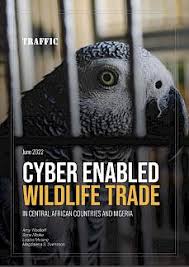-wildlife trafficking is rising by between 5% and 7% annually, two to three times faster than the global economy, researchers have said.
John Cassim

Harare, Zimbabwe (CZ) – Government agencies across the world are increasingly relying on NGOs to address enforcement and legislative gaps that result from the low political priority given to wildlife crime.
NGOs help facilitate cooperation between states directly by assisting with information exchange, and indirectly by supporting efforts to build trust and relationships.
In some cases, there are safety, security, and legal risks involved with NGOs playing this mediatory role.
There is also a risk of creating a dependency on NGOs, instead of national agencies developing the required capacity and commitment to lead such roles.
To identify the current view on cooperation with an aim to developing solutions for a system that seems to be failing to address transnational wildlife crime, the Global Initiative Against Transnational Organised Crime (GI-TOC) and the Wildlife Conservation Society (WCS) conducted research into the challenges facing international law enforcement cooperation regarding this issue.
-research methodology
The research set out to investigate the practical realities of international cooperation and understand why there is a disconnect between the ideal mechanisms for cooperation and what happens in practice.
This report is the result of a combination of desk research and semi-structured interviews.
The desk research involved the review of academic papers, government reports, civil society research, journalistic articles, bilateral agreements, and international treaties.
The geographical focus of our research was Africa and Asia, as these are two regions connected by major illicit wildlife flows.
The illegal trade in rhino horn, elephant and hippopotamus ivory, African pangolins, lions, animals for the exotic pet market, South African abalone and, increasingly, protected plants such as succulents show the predominantly west-to-east illicit flows from source countries in Africa to consumer markets in Asia.

-online illegal wildlife trading
Meanwhile, a call has been made for African online platforms to take urgent action to address illegal wildlife trade.
Leading civil society organisations have urged African online platforms to take immediate action to address illegal sales of threatened wildlife happening, at scale, on their e-commerce and social media sites.
According to recent reports published on online markets for African grey parrots and the cyber-enabled wildlife trade, there is evidence that the sale of threatened animals is likely to be contravening local and international laws.
Together, the Global Initiative Against Transnational Organised Crime (GI-TOC), TRAFFIC, and the World Parrot Trust are raising concerns that platforms in Africa do not have policies regarding the sale of wildlife, and those that do are not ensuring that these policies are effectively enforced.
If this situation is not reversed, the impact on wildlife populations and biodiversity across the region will be severe.
The three organisations emphasise that the harms of the illegal trade in wild species are immense.
The trade undermines states’ efforts to manage their natural resources, threatens species with extinction, affects community livelihoods, and can increase the chances of the emergence of new zoonotic diseases. Moreover, criminal networks involved in wildlife trafficking are linked to other serious crimes, including fraud, corruption, and money laundering, as well as the cross-border trafficking of drugs, arms, counterfeit goods, and people.
According to INTERPOL, traffickers are advertising and selling wildlife and wildlife products on social media platforms.
Gaining access to a vast international marketplace and following the same routes as other crimes, such as drugs and weapons smuggling, wildlife trafficking is rising by between 5% and 7% annually, two to three times faster than the global economy.
Regulation of online market spaces by law enforcement or the platforms themselves is struggling to keep up and remains limited at best.
This research was shared with leading e-commerce and social media platforms; however, according to ongoing monitoring by the GI-TOC, action to address the problem still needs considerable improvement.
“Most of these platforms promised to take action and remove such content, but our monitoring effort for live birds from June 2022 shows that advertisements for endangered species were found, again, on almost all these platforms.” Giulia Roncon, GI-TOC analyst on environmental crime
Three exceptions were the e-commerce sites Jumia, Afribobo, and Afribaba. Jumia responded positively by removing a significant number of related advertisements and developing new wildlife policies as a result. Afribobo removed all adverts of illegal species and introduced filters to prevent new adverts on the site that potentially violate their policy or national legislation in Cameroon.
Afribaba has committed to introducing similar filters in 12 other central, eastern, and southern African countries. These sites are encouraged to remain vigilant and to continue to enhance procedures and protocols.
